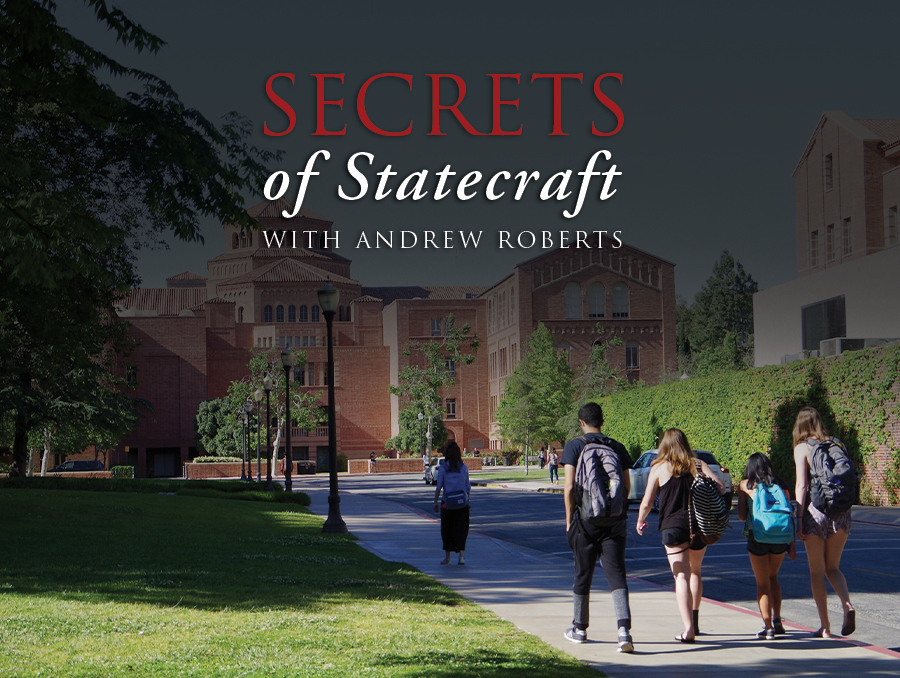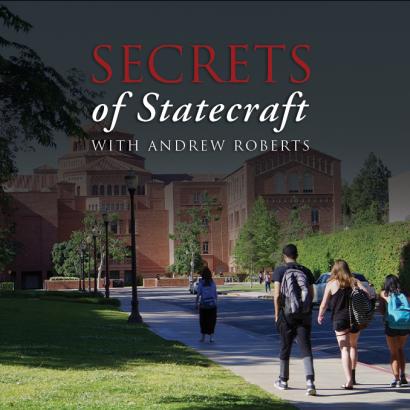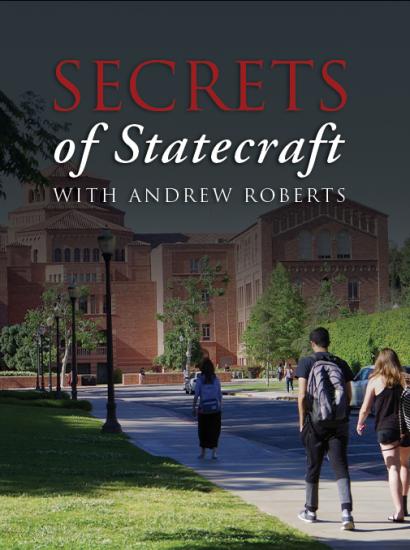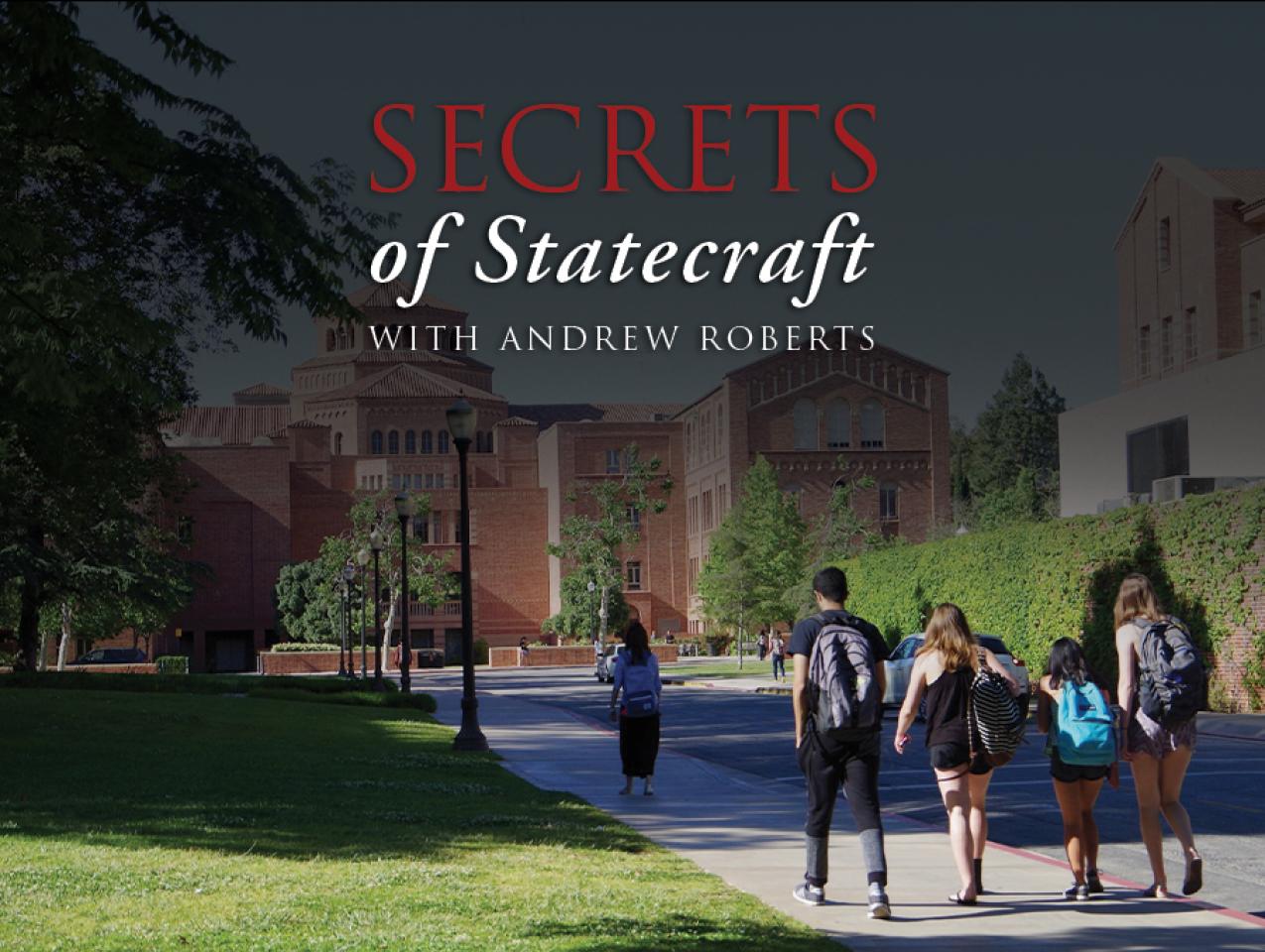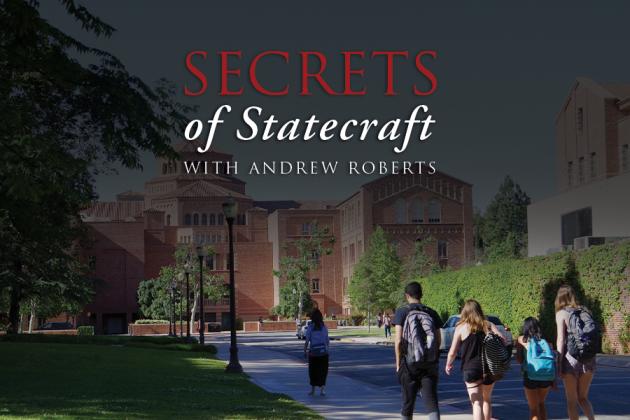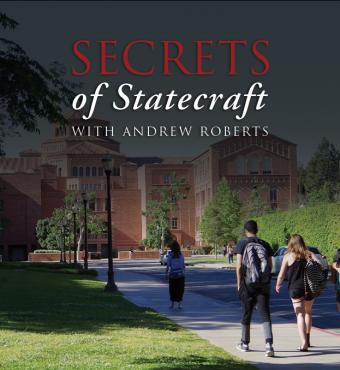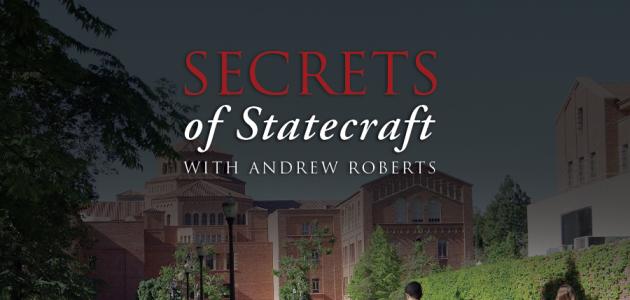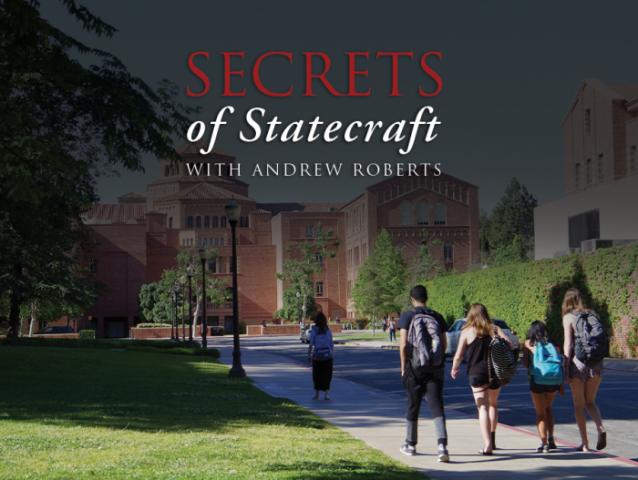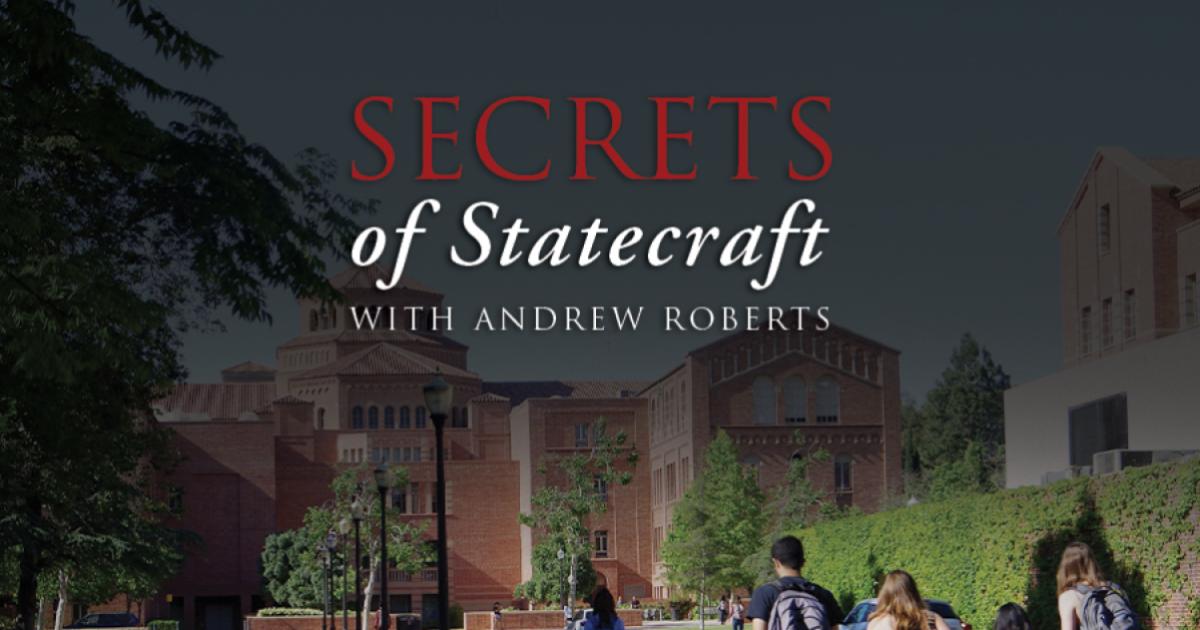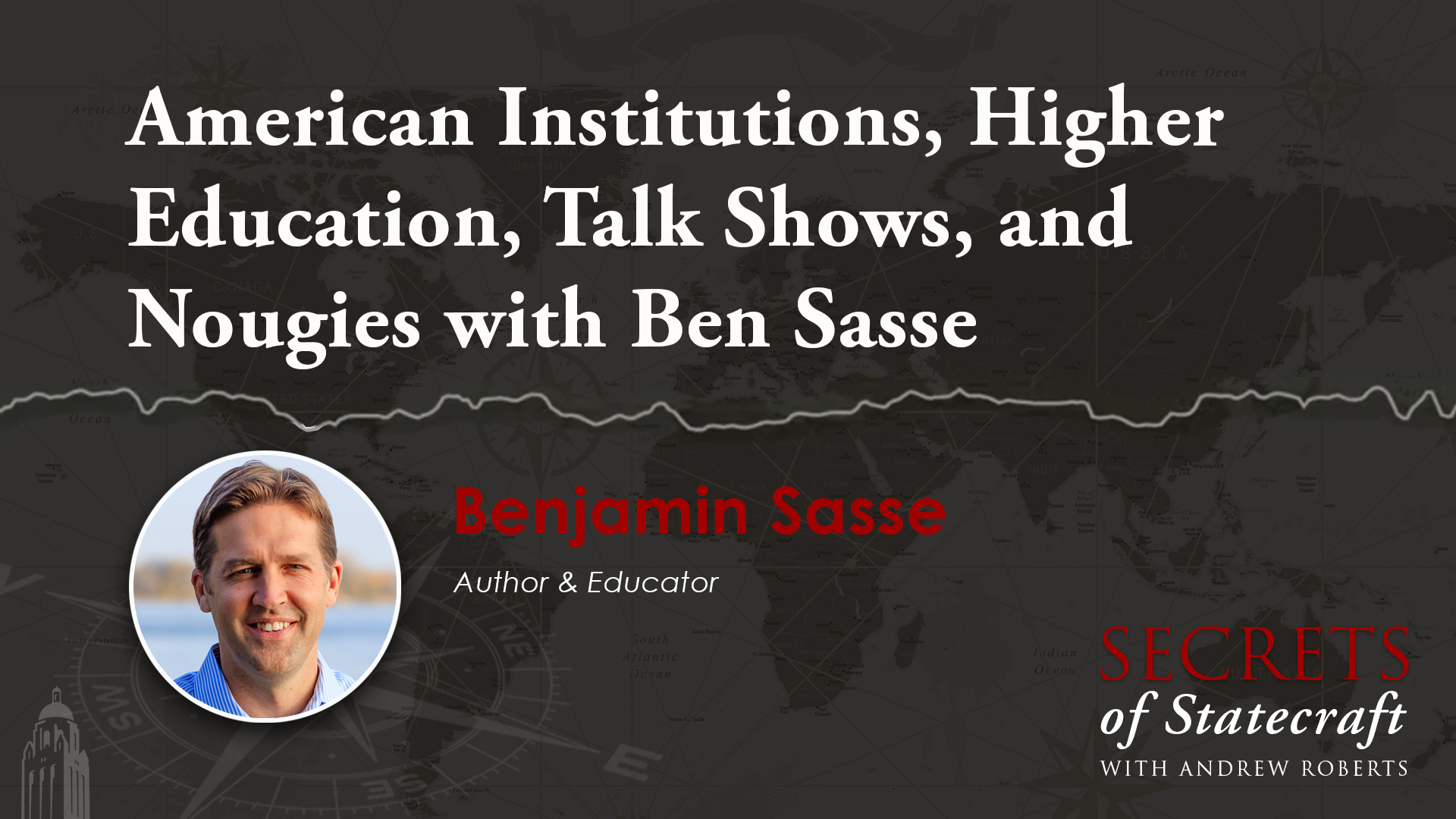- History
- Congress
- Higher Education
- Politics, Institutions, and Public Opinion
- Revitalizing American Institutions
Former US Senator and university president Ben Sasse joins Andrew Roberts on Secrets of Statecraft for a candid and very wide-ranging conversation about the state of American institutions and how to revitalize them. Sasse explains why Congress has become weak and dysfunctional, why entitlement spending and debt threaten U.S. stability, and how social media distorts our politics. Sasse also takes on higher education—grade inflation, the replication crisis, and Harvard’s decline—while reflecting on the coming challenges of the AI revolution. In addition, they also discuss the extinction of late-night comedy, foreign policy, tariffs and trade wars and Iran, China, and Russia. And yes, Ben explains to Andrew what a “nougie” is.
>> Andrew Roberts: Ben Sasse is a former U.S. senator from Nebraska and former president of the University of Florida. Ben, you've served on four of the most powerful and important committees in the U.S. Senate. Finance, Intelligence, Budget, and Judiciary. So you probably better than anybody else would be able to answer this question.
Is Congress dysfunctional? And if so, why?
>> Ben Sasse: Well I guess I answer the question by starting with a challenge of the premise because I don't know that there are any most powerful committees in Congress because there aren't really powerful committees in Congress right now. Yes, it's definitely dysfunctional.
The small subset of things that Article one can get done right now have to be organized out of the leaders offices and that's a almost 20 year long trend. So the committees are not at all powerful. Congress obviously still fulfills some of its constitutional obligations, but when I was running for office in 2013, 2014, having never run for anything before in my life, I would talk constantly about executive overreach or judicial overreach.
And those are big problems, no doubt. But the much bigger problem is legislative underreach. And I think the founders would be stunned to find branches that aren't jealous of their prerogative. So yes, Congress is incredibly weak and dysfunctional and most of it is a self deterrence.
>> Andrew Roberts: And what can be done about it.
>> Ben Sasse: I like a lot of the people who are there individually, but we have to run different kinds of candidates and the public needs to demand people who don't think politics are the center of life, but when they go there to do their job, they want to actually do their job, not use Congress as a platform for commentariat aspirations.
And right now I think, you know, if the Republic survives, which I think it will, but two, three, four decades from now, when you look back on this moment, we will think that we finally figured out how to communicate with each other in a new world where social media and broader than that, but the digital revolution.
But let's focus narrowly on social media for a second. Social media has given so much more voice to some of the loudest, angriest, strangest voices. And the broad consensus on a lot of issues in this giant center right nation get almost no voice relative to people who do think politics is the center of life and want to shriek a lot.
And there are a bunch of politicians who have come to believe that those people are representative. And we have tons of data that shows they're not at all.
>> Andrew Roberts: And is Congress actually exercising its constitutional rights? You're on the record calling tariffs, at least certain types of tariffs, dumb, and the trade war Against China nuts.
And yet it seems to me that under the U.S. constitution, tariffs and customs and duties and so on are to be decided by Congress and not by the White House. Is that a sort of dereliction of duty on behalf of Congress?
>> Ben Sasse: Definitely. My great seventh grade adjectives there, dumb and nuts.
I could be more articulate, but I think those both stand up. Let's maybe say something about the tariffs, but let's also tie this back to your earlier comment about budget committee and the budget. Definitely these are are inarguably Article I powers. The power to tax and the power to spend is an Article one power.
The President can veto legislation and it can be overridden. But things like taxation have to originate in the legislature and in particular in the House of Representatives. And the legislature has to actually care about bringing the public along with why trade is a win win. And right now we have a Congress.
I'm not meaning to be narrowly critical of particular Congress. Congress of course being the word that means a two year meeting of our legislature, but I mean for one and a half, two decades long, Congress has preferred to punt powers to the executive branch. And obviously in the form of our current President.
We have someone who has longstanding views that trade is bad and so therefore he wants to impose these tariffs. I disagree with it as a policy matter, but in some ways the problem is less the executive overreaching than the legislature not exercising their prerogatives. But let's put that in the context more broadly of the budget.
I think, don't quote me exactly, but I think the Budget act that we have right now was passed in 1974. It roughly worked from 1974 to 1978. And in the whatever the math is, 47 years since 1978, I think that Congress has passed more than 30% of the budget under a regular statutory process only four or five times in 47 years.
What happens the other 42 of 47 years is Congress doesn't get its work done. It becomes September 27, 28, 29 fiscal year of the US government and September 30 and we're faced with this absurd false choice between maybe we should shut down the government or just do everything we did last year plus 2% and let's have cataclysmic headlines about the end of the world because we're going to shut down government, which is never really true.
The government doesn't really shut down. If these things are worked out on October 4th or October 11th instead of September 30th, it's not that big of a deal. But the idea that we should just fund everything we did last year plus 2% is nuts. There are a whole bunch of things that we did last year which should be funded at 0 or 10% of what we spent last year.
And there's some things that are really effective and should be funded at 110 or 130% of what we did last year. But the Congress mostly doesn't pass a budget. We do incremental changes on whatever we've been coasting on since 1978. That's a bad way to run a republic.
>> Andrew Roberts: And how does the big beautiful bill fit into that overall perception?
>> Ben Sasse: I mean, maybe to link that precise question with the broader shared facts social media environment we live in. And if you listen to the headlines over the last three or four months about the big beautiful bill, and let's give the President credit for, you know, constant branding genius that he was able to take a piece of legislation that happens maybe not every year because the use of reconciliation powers is a little more about a moment where there's been a change of power and there's a split between a majority in the Senate and it's maybe precedent before the President and Senate of the previous Congress.
But almost every year this happens that there's a big piece of legislation that tries to use the reconciliation powers, which for the hopefully super majority of your audience that are not legislative nerds, what reconciliation means is once a year you can pass a law that doesn't have to get over filibuster protection.
So you don't really need a 60 vote threshold. There are certain things you can do around appropriations that only need 51 votes. And the President, it was genius to name it this, but at the end of the day, passing the big beautiful bill or not passing the big beautiful bill was framed in the media as this giant cataclysmic difference.
And the reality is the difference between those two things is small. I have a triangle in my head. And if you had a bottom left, it could be not passing the legislation. A bottom right is passing the legislation. Big beautiful bill. And on that debate I'm 55, 45 for passing it or 60, 40 for passing it.
But what you really need is the top, the triangle, which is what if we actually told the truth to the American public about what our budget looks like? Because we're on a ridiculously unsustainable path. The total federal spending, I'm doing this off the top of my head, so again, don't quote me for precision here.
But I think the Fisc is right at about $6 trillion this year. About 2.6, 2.7 trillion is entitlements. So Medicare, Medicaid, Social Security, Obamacare, interest on the debt this year will be 750, $800 billion. The Defense Department will hit about $1 trillion this year. I think that probably that's a little too little spending, but probably half of the trillion is wasted.
We're spending on the wrong things. In a world where we're headed toward the miniaturization of war and hy fair in a cyber environment. You put those numbers together. 2.6 trillion, 750 billion. A trillion. We're now at what, 4.2 of 6 trillion. The entire discretionary non defense budget is only about 1.8 trillion of the 6 trillion.
And it's the thing that the public fixates on because it's what partisans in the Congress want to yell about. You've got a stupid discretionary domestic program that weighs 6 million or 30 million. Of course we should care about stewarding all of the taxpayers dollars. So 6 million or 30 million matters, except that it doesn't matter in any way against a denominator of 6 trillion.
The only stories are interest on the debt and entitlements, Medicare, Medicaid, Obamacare and Social Security. And therefore the interest on that is what might bankrupt the country or not. You could end all the discretionary spending the government does and it still doesn't really solve the problem. We have to tell the truth about entitlements.
And so the top of the triangle is tackling entitlements and the Congress. Neither party ever wants to do that.
>> Andrew Roberts: The Sunil Ferguson, the historian has pointed out in a very thought provoking article about how he calls it Ferguson's Law, Named after an 18th century Scottish economist, not himself.
That when a country spends more on debt repayment than on its military, it is, it starts to decline. And America looks like from the trajectories that it's not going too, it's not too far off actually doing that. Is that, is that something that worries you?
>> Ben Sasse: Worries me terribly and we should praise Neil for the attention he has put on this.
And I want to agree entirely with the premise, but let's come back to that for one second. Make two side comments. One, when I'm in the presence of Sir Andrew Roberts, I need to be properly deferential to the lords among us. But it's still tough for me to call Neil sir.
You and I both know and care about this guy. And so number, number one, Sir Neil is still just got to be. Come on, let's give Neil noogie. And number two, it is genius.
>> Andrew Roberts: Apologies. It's an American.
>> Ben Sasse: Sorry, I already did Nuts and dumb as seventh grade behavior.
>> Andrew Roberts: Yeah.
>> Ben Sasse: Seventh grade boys wrestling in a hallway at school is when you put someone in a headlock with one arm and you use your knuckles from the other hand to.
>> Andrew Roberts: Yes, yes, we have that in England as well. That's a noogie. Got it. Good. All right.
>> Ben Sasse: But Neil, you said, Ferguson's Law is named for an 18th century historian, not for himself. Let's both be clear if that old economist or historian wasn't named Ferguson, we wouldn't be talking about as Ferguson.
>> Ben Sasse: So it's partly because it's funny.
>> Andrew Roberts: Yeah, all right, I'll definitely give you that.
That's an intellectual noogie. That is, though, frankly.
>> Ben Sasse: He is both as a logician and rhetorician. He is a special, special man. And he's right to draw attention to this. The concept is exactly right in the long term, a world that is orderly, where there is free trade, rule of law, open navigation of the seaways.
Commerce among people that's not mediated by politicians and bureaucrats is a better, safer, more remunerative, more stable place. And so we need to spend enough on national security to maintain open seaways in Asia. And so we mentioned earlier that the trillion dollars the Defense Department spends is not a full defensible trillion dollars.
Because so much of it is on legacy systems that not only should be retired, but that we know will eventually be retired. And so there are a ton of legacy payments for an unwillingness of two and three star generals thinking about when they depart, what their next job is, and of politicians to take on home state interests.
So we don't, at the end of the day, reform defense spending like we should. But it's not that we're spending too much, it's that we're spending it on the wrong things. So we should have a hefty share of total spending on national security. And I think most Americans still have in the back of their head the idea that the government is what it was from 150 years ago until 50 years ago.
Which is the government is a giant military that also happens to have a few social safety net programs. That's what the government should be. Instead, what the government really is is a giant insurance company that just happens to own a navy. And so we are living a reality of a government that's almost all entitlement spending and spends too little on defense and too little on the right kinds of defense.
And Neil's worry that we're headed toward a world where defense gets crowded out by debt service is a world of decline, both militarily, geopolitically, but also economically. Because politicians won't be able to fix it fast enough once interest spirals out of control. You won't be able to cut entitlements enough on a one year basis in the middle of an economic crisis.
And so I'll stop with this. If you have a failed treasury auction on a Tuesday morning, if you jump 30 basis points or something that then become 2% a month later. You're in a cataclysmic spiral that nobody really knows how to fix in that moment. And right now we shouldn't presume that all of the 30 year Coupon or sorry, 360 month Coupon Treasury Bills that were sold.
I'll do the math in September of 1995 that come due in September of 2025 are going to have enough buyers. So Neil's right to be worried about this.
>> Andrew Roberts: Let's move on to the overall idea about this whole podcast is going to be revitalizing American institutions. Another really important one is education, isn't it?
You've been president of two universities, and recently you wrote in the Wall Street Journal that Harvard in particular has been qu cowering before vandals and anti Semites. Endless celebration of regressive identity politics, administrative bloat and indefensible tuition hikes and corruption of teaching and research. And of course, you're absolutely right on all of those.
And you go on to mention more what could be done about that and what do you think might be done about that, considering how much the administration is attacking Harvard at the moment?
>> Ben Sasse: Well, I think in the Harvard v. Trump debate, which is often how I think about what's happening with political fights around higher education, I find myself mildly against both sides.
The administration is trying to force reform and their right to want to force reform to the degree that they're using the levers of federal power, private sector institutions, and pluralism. What I think of as civic tocquevilleanism is one of America's and the West's greatest strengths. So we don't want politics to run private sector institutions.
So I'm wary of these reform efforts. And yet when things like the Civil Rights act are violated with the way Harvard treated its Jewish students in the two years after October 7th, it's right for the administration to push for reform. Harvard, on the other hand, we should want it to be in all Ivy and Ivy plus institutions and all of higher ed more broad.
Broadly should be accountable to a board of trustees at every local institution that is trying to serve students, parents, employers, the broader public. There are many, many, many purposes of higher education. But in reality, most higher ed institutions, as you know, multi stakeholder organizations are first and foremost accountable to their tenured faculty and their tenured that it shouldn't be the case, but that's how they responsibly not responsibly as in it's good, but responsively in terms of what they actually react to.
These institutions have so much small c legacy conservatism to not change. And the bureaucracy of faculty senates demand things that are not serving their constituents and are not moving forward with things like the AI revolution. And so we should want reform. And so I think at a macro level, it's really sad in this moment in the digital revolution that we're setting so many kinds of institutions on fire and yet almost every individual institution that has a fire on its hands deserves it.
And so what Harvard should want to be doing is saying to their board, we'd like to have a public conversation about what it means to be accountable 2 and 5 and 10 years from now to, to our constituents. What should we tell students our brand promise is if they come here in the fall of 2027 and they leave in the spring of 2031, what difference are we going to have made in their lives at both preparation for work and preparation for life more broadly?
Because the false choice between does the university exist to prepare people for a job or does it exist to prepare people for life? The right answer is yes, not an or statement. And right now there is no clear brand promise at most of these institutions. There's not nearly enough life change happening.
And yet inside the conglomerate of a place like Harvard, lots of really, really special things happen. There's some biomedical research happening at a Harvard or an MIT or a Stanford that's breathtaking and wonderful. Is the average undergraduate humanities student getting enough life change experience in their 45 months on campus that it's worth it?
Absolutely not. And the main problem isn't money, it's time. The opportunity cost of being 18 to 22 year old is gigantic. And these institutions don't do enough great stuff for their students and yet they.
>> Andrew Roberts: Are giving everybody 4.0 grade point averages, especially in the humanities, aren't they?
It's extraordinary, I don't know, you were a graduate yourself of Harvard. I went to Cambridge. In my day it was nothing like that. You know, you really had to work for a, for A first, and they didn't give out many. Nowadays, about one in three people get them.
At Cambridge University, there's been massive grade inflation and that has not helped, has it?
>> Ben Sasse: It's a massive problem. I just want to acknowledge I quarterbacked the Oxford football team, American football team, during a junior year abro in the fall of 1992. And we are not going to mention the game that I led our team to losing 19 to 0 in Cambridge.
I was just absolutely destroyed in charge of a bit more. Thanks very much. I was not on the quarterback. I returned a kickoff and I think I had negative yards on a kickoff return, which is pretty much a feat. Anyway, you're putting great inflation, I have a daughter who graduated from Harvard two months ago.
Average GPA at Harvard, and her graduating class, I believe, was a 3.83. And like everywhere, humanity's grade easier than the STEM disciplines. And I think the STEM average at Harvard right now is 3.65, which is obviously ridiculously inflated as well. But that tells you that the humanities grades are probably3.9, slightly north of a 3.9.
There's no point in having grades if the. If the normal experience is. For every kid who gets a B, there's a multiple of kids getting an A, and no one's getting less than a B. You're not getting any feedback loop that helps, helps you refine whether or not you're rigorous enough in your class prep and in your writing, et cetera.
And so there are arguments for different kinds of assessment, but having grades and having everyone get a perfect day all the time, it reminds me of the Garrison Keeler joke back on Prairie Home Companion Minnesota, where every kid is above average. It just isn't a healthy enough feedback.
>> Andrew Roberts: Alice, in one's land, where everyone must have prizes, that's the other classic example of it, isn't it? Do you think this is in some way related to the incredibly high tenure rates that you get sort of 80 to 90% tenure rates in at Harvard?
>> Ben Sasse: Absolutely. And I mean, it's dangerous for me to talk about the history of higher ed with an expert like you because you know the field so much better than I do.
But I think one of the glories historically of the American higher ed system is the combination of a British or precisely an English model with the German research institute model, where you put into one tenured faculty member both of these callings of Oxford dawn and great research bench scholar.
It is a glorious thing when done right, when not done right, which is what's happening now, it Means the desire people have to research, which in the STEM disciplines is real, and in the humanities is occasionally real, that that research can become the only real calling people have.
And so what they want is to spend the least amount of time teaching possible. And so you have a lot of humanities professors that seminars to just work through their own article, which is being written to be read by dozens in overly nichified narrow fields. And students know that this is a waste of their time, but they like the sort of conspiracy of silence around lower expectations.
The professors don't want to do a lot of work, and they certainly don't want to do a lot of grading. And the students don't want to do a lot of work and they want to get a good grade. And so the only lever they really have is complaining or faculty feedback evaluations.
And so there's a vicious cycle where standards continue to decline. I don't want to do a golden age theory because I don't know if I would say that was early GI Bill, 1947, or if it was 1965, or arguments for certain things that worked better in American higher ed in the 80s than today.
But what's clear is average grades once upon a time were below a3.0. They then rose to being slightly above a3. They sat there for a few decades, and the most recent rise to a 3.8, 3.9 at these institutions is terrible. And it's combined with all of the University of Chicago academically adrift literature that show that not only are the grades getting easier, the workloads are getting much, much easier.
I want to be clear, there's an outlier here. Certain engineering disciplines, certain computer science disciplines are super rigorous. But in general, American college students work about 40% as hard, about 40% of the total time demand as 30 years ago.
>> Andrew Roberts: Wow. I mean that's, that's appalling, isn't it?
They spend the rest of their time on TikTok and Instagram and so on. What are they doing?
>> Ben Sasse: That is what it is, I mean the data we know the consumption is 7 plus hours a day on doom scrolling. And I'm not saying this as a grumpy old man.
Get off my lawn. As a 53 year old screaming at them. I'm saying that five and ten years from now, and frankly, five and ten weeks from now, they will know or they already know that this isn't good for them like this. If you could go back and relive any stage of life being 18 to 22 is a pretty good candidate of the most interesting time in life.
Don't waste it. It would be far better for most of these students to get a backpack of great books and a couple of friends and travel the world for four years than to spend their time at these institutions. Well, that's a shame, because there are giant brains that could be shepherding them.
>> Andrew Roberts: Yeah. As Winston Churchill said, 20 to 25, those are the years. You've also criticized what you call a replication crisis in many fields. Tell us about that.
>> Ben Sasse: You know, I'm just derivative here. I'm just borrowing. But it's very clear that in a lot of social science disciplines in particular, people will come out with big headlines about what their data supposedly showed and the journal articles which are again, captive to your 80 and 90% tenure rates.
The people that run nichified social science and to a large degree, humanities disciplines that tenure, everybody that goes through the guild and says the things people want to hear. This is not the same as a search for knowledge and a search for truth. If other scholars couldn't go and run the same kinds of experiments in sociology or psychology or anthropology and find similar outcomes.
And that isn't what happens. We know that in lots of these fields there isn't really a lot of rigorous evaluation going on of the things that are published in the ostensibly most reputable journals. And if those studies do get replicated, the data doesn't show the same things. What's going on?
Why are we funding this, and where are the boards?
>> Andrew Roberts: And referring to funding? The administration is cutting 2.6 billion in grants. They're talking about ending tax exempt status. You've written about how there's a, quote, there's a massive gulf between finding new cancer treatments and subsidizing activist professors, advocacy for Hamas.
How does one fight the political ghettoization of these elite universities? Sorry. And isn't the administration's sort of big stick of cutting billions not necessarily going to do what it's meant to do with regard to politics?
>> Ben Sasse: Yeah. I'm not in favor of these across the board cuts because there's a lot that's happening in biomedical engineering that should be funded at a much higher level, not a lower level.
There's a lot in different forms of biologics and pharma research, where the decentralized system of our elite med schools across the top 15 to 30 universities is great and we should be doing more of it. And so we need to draw these distinctions. It's similar in a way.
I won't linger long here since it's different than your question, but it's similar in a way to how we talk about student debt. There's a huge difference between a doctor coming out with a certain amount of debt for a professional degree that it's going to lead to a really high income over time.
The debt service on that is a tiny share of future earnings. You can make an argument that we have way too little student debt around certain kinds of professional disciplines. But there's a difference between doctors and dropouts. And we have a ton of student debt, and that is people who went to an undergraduate liberal arts college for two or three semesters and then dropped out.
They would have been much better off going straight into a trade at age 18 than having a year and a half in college and now a whole bunch of debt that they need to service going forward. So there's a difference between dropouts and doctors around student indebtedness. There's a difference between funding certain kinds of humanities research and funding a lot of STEM disciplines.
So I wish what the administration was doing is saying, hey, there's a massive ROI on certain kinds of higher ed funding. We ought to do more of that basic research. The federal government ought to be funding a lot of stuff in physics through the plural distribution mechanism of our higher ed institutions.
But right now we don't do that kind of distinguishing, partly because of the stuff we said at the beginning about the Congress not having a real budget process. But most fundamentally, we don't have diversity, intellectual diversity in American higher ed institutions because boards don't ask hard questions. Boards should be asking, why do we assume similar research leave loads in the humanities and in very hard sciences.
In hard sciences, if you've got a professor who's very research productive, let's relieve her or him from even more teaching. Maybe they should teach a 0:1 load instead of a 1:2. But we've got a bunch of humanities professors that probably should be teaching a 3 3. And there's nothing wrong with that.
It's not. It's a noble calling to be a great teacher, but don't fake that you're researching if you're not.
>> Andrew Roberts: You mentioned earlier about the AI revolution, which obviously is going to have an effect on the number of jobs that humanities graduates are going to have anyway in the, in the coming years.
Are we ready for the way that AI is going to change our lives?
>> Ben Sasse: Not in any way. And then we need to distinguish who all the we are, because we have many, many different communities, policymake moms and dads, humans who are easily distracted as we are employers, etc.
One of the ways I think about this is I do a lot of work in this space. I'm not a technologist, but I do a lot of AI and things. So AI and corporate board strategy on defense tech or on ED and workforce tech. I do some things on athletics, finance, and I Believe that when you hear the technologists talk, the debate is often immediately between the accelerationists or the optimists and the safeties or the lean pessimists.
Do we need more regulation because killer drones are going to kill us all soon? Or should we just view this as a utopian future that arrives two years from now or 12 years from now? I think the optimist pessimist debate or the acceleration of safeties debate is way too simplistic.
Because if you force me to choose there, I'm going to choose optimist. But it's much, much deeper than that. At the level of drug development, AI is going to do amazing things. At the level of does a 13 year old or a 16 year old have a sense of the good?
Right now it's doing bad things. Reading long form stuff is really important for your intellectual and moral and spiritual development. And 13 and 16 year olds read almost no long stuff. The tiktokification of their attention span is a tragedy. And so I like to think of it as the future of these tools is going to have a massive class divide.
And the class is not socioeconomic class, it's intentionality versus not. For those who use these tools, instead of being used by these tools, those who can use these tools, it's going to be massive leverage across almost every vertical in life. For those who decide instead to outsource their attention and their affections to these tools, it's a disaster.
And it would be much better if we didn't have them. Because just having more material stuff doesn't really make people happier. If you're super, super, super poor, if you go to bed at night and your stomach hurts because you don't have enough food, getting a little wealthier is correlated to happiness.
But if you're going from middle class to upper middle class, or upper middle class to rich, there's not a lot of data that shows people get a lot happier just because they have more stuff. The AI revolution is absolutely gonna produce that kinda largesse. But what we want is people to get more agency out of using these tools.
And you said, are we pre prepared for this? Definitely not. We are moving to a world where people are giving more and more of their consciousness. And this is before there's even a temptation of implantables. Maybe we should nerd out for a second. Back up. When we think about the history of the human interface with the tools.
We had a mainframe era, a desktop era, a laptop era. We live in a mobile era. Now we're moving into a lot of wearables, but we. We're clearly headed toward a world with implantables and implantables. If you mean nanobots swimming around in our blood stream curing cancers before we were even symptomatic, that's pretty glorious.
That's gotta logical. But if by implantables you mean the ability to take the attention and consciousness grabbing algorithms that TikTok and Instagram have and putting them straight into a nine year old's brain so that they make no intentional choices. This is the kinds of things that Huxley feared.
And the Huxley vs Orwell debate. Will we die in the future because of some totalitarian thing that comes from the outside or something that we allow our pleasures to tempt us into? Huxley was the genius.
>> Andrew Roberts: My God, that's the most scary thing I thought I've heard of for a long, long time, Ben.
But you're right, that's where people are moving. I was talking just the other day to somebody at in Silicon Valley who's been working on implant things in in brains to make the. But this is largely actually for. For immediate entertainment as opposed to sort of making people cleverer or anything.
I suppose in a way this most most likely that this kind of thing is going to start in China or some other totalitarian country that wants to control its population more than thank God we do.
>> Ben Sasse: Maybe, maybe two. Two little footnotes on that one is it is in the long term race between free societies led speaking Western world versus the CCP.
Because of course our battle is not against 1.4 billion Chinese people, 1.4 billion Chinese souls. But it is against 2,000 CCP lackeys that think Chairman Xi should be dictator of a bigger share of the world. It is telling that we should get the benefits in the west of decentralization and the downsides of centralization should be what they're stuck with.
But weirdly in a world where we're so tempted to distraction, the the Chinese plan to limit teenage kids time on video games and doom scrolling is a weirdly centralized pro agency theory of human anthropology and coming of age. And so I agree that surveillance state tech implantables can be used in the most disastrous way from the ccp.
But it is telling that they export tools like TikTok to the US and then they don't give that kind of drugs to their own children. And so, the second footnote is, if we were doing a day long. If Sir Andrew Roberts decided to start doing a Rogan length podcast, the topic to go to here would be robot sex.
Because where we're headed is to a world where the porn addictions of giant shares of the American public are going to have robot attachments and a whole bunch of humans are going to decide that the our technological overlords are way more appealing than the actual world. And that's not true.
That's not good. And the way to get there is, is to draw bigger distinctions between AI assistance, which can be great, and AI companionship, which is a farce. And yet we're going to be really inclined to self delude into AI companionship because it can be pretty great companionship, seemingly, but not truly.
>> Andrew Roberts: Talking about fast, let's talk about late night comedy. You wrote an article in the Wall Street Journal recently about the sort of essentially the death of late night comedy in America, using as the peg Steve Colbert's show ending with and sort of collapsing in huge amounts of debt, not least because he paid himself so much.
But nonetheless, what, what, what's gone wrong with, with late night comedy in this country?
>> Ben Sasse: So two things have gone wrong. But first, as a backdrop, I don't want to talk about this in a nostalgic way that implies, you know, 1956 to 1996, where the golden age, you know, shared culture in human history.
I mean, I do come from a little farm town in Nebraska called Fremont, which is only about 90 minutes away from a similarly sized sports competitor we had when I was a kid named Norfolk, Nebraska, where Johnny Carson is from. So if we were going to go truly nostalgic, we could talk about Carson for a long time.
But that was not the high point of human civilization. But it was a special gift that you got to have some stuff in common that didn't have to be immediately tribally political. So there are two things wrong with what happened at late night. Number one, and most fundamentally, the digital revolution gave us many, many, many, many, many more choices.
And that's pretty great. When you went from three to four channels, we knew it was good. When you went from four to 500 channels, it seemed good. When you go from 500 to 2,000. The quasi libertarian in my soul does not want to criticize people having more choice, but we should recognize the trade off.
The downside consequence is when every individual has lots more choice, it means that collectively we have a way less in comm. Basic thing that happened is we got to 2,000 choices. And so when Carson would have had a share that was tens of millions of Americans at a time when there were only 180 million Americans, it meant that it was shared.
It was something that in common culture we had in common. And today where there is nothing except for the super bowl that commands any audience of any size, it means that it's all nichified. The second problem is the response of late night comics when they couldn't go wide and meaning medium deep was once they were narrow, then they decided to go very deep around audience fan service.
And once they knew that they were left of center, partly because of the age demographics, partly because of pop culture consumption, they decided to go super political. And the Colbert's of the world then decided to commit suicide. You make an important economic point, which is this show is supposedly 100 plus million dollar production annually and he was losing 40 million of that.
Half of that loss was his own salary. So there other ways they were committing suicide. But doubling down on a partisan tribal audience is narrowing in ways that are unsatisfying even to those who are the deep consumers of it. But also it's just not that funny. Stephen Colbert on Comedy Central 2020 five years ago was funny.
I've done his show. And you didn't think you were going on a comedy show. You knew you were going on a gotcha politics show because going for jokes wasn't really the purpose. And so there are two things that went wr the partisanship of being narrow, but fundamentally the structural narrow economics of a digital world with giant supply side optionality.
>> Andrew Roberts: And essentially, it balkanizes the culture.
>> Ben Sasse: Tighter way of saying it.
>> Andrew Roberts: Going on to foreign policy now in the last few days the British government said it's going to recognize Palestine. And as a country, even though Palestine doesn't have set borders, it doesn't have a single government considers itself to be refugees of another country rather than a country of its own and so on.
There are various, you know, obvious hurdles and, and problems. But also, isn't it a reward for October 7th and the and the horrors that took place on that recognize Palestine.
>> Ben Sasse: You went exactly where I was going to go in your last sentence, which is obviously the complications in the human soul, in human arrangements are not decades long, but millennia long.
And lots of this. We could do precise history over the last centuries in the Middle East. But the narrower question to me is why is the labor government making this decision in the summer of 2025 when they didn't make, when this decision wasn't made? Obviously labor wasn't in power at that moment, but in the summer of 2023?
Or why was this not the British position in the summer of 2015 or 2005? Because this is happening now after October 7th. A grotesque terrorist attack on a civilian population unprovoked. And so I, I don't understand the politics of your country and I would love to understand it better.
But yes, it seems like an absolute reward. And there have been attempts to have a two state solution in the past that were rejected in different ways at different times. And this seems like nothing but a reward for terrorism, which beget more behavior. The same.
>> Andrew Roberts: Staying in the Middle East.
You've often criticized President Trump, but the decision to bomb the nuclear facilities in Iran was something that no previous American president for the last five or six has actually taken. Don't you think that it was a good idea to have done that?
>> Ben Sasse: Absolutely, yes. It should have been done when all sorts of caveats around prudence, but it should have been done when you knew that the calculus around disastrous attack from the leadership of Iran was becoming operationally conceivable with where they were in the development of their programs.
But as fundamentally, these folks have sponsored all this is the world's largest terror sponsoring regime. And everywhere to the west of their borders, they've been funding attacks against the US and against Israel and against a whole bunch of innocents in that region for so long. And I also applauded the president's decision to go after Soleimani at the end of his first term.
So many portions of the president and especially his team, the president's decisions and his team's execution are to be applauded.
>> Andrew Roberts: And do you think there's a chance now that the president has seen through Vladimir Putin with regard to Ukraine and might be in a position to both be tougher on Russia and also kinder to Zelensky?
>> Ben Sasse: It's very hard for me to understand. I've never met Putin. It's hard for me to understand why he has had this charismatic power on so many American presidents. He is an evil, evil thug. But I definitely am hopeful that President Trump is seeing the reality about him, the idea that if he gets what he wants in Ukraine or if he gets enough of the territory that's in conflict, that he would then stop.
Seems to me completely fanciful thinking. And so you have to stand up to Putin at some point. And right now, having the Ukrainians willing to fight courageously, as they have for so many years at this point is the best tool we have, even at a narrow, call it America first mindset about it.
But the reality is America first for the long term means America with lots of allies and NATO has been fragile. And I'll also applaud the President on how he's gotten many NATO members to step up their defense spending. He's been very effective at that. But we should believe that NATO, the most successful military alliance in the history of the world, is the most successful military alliance in the history of the world.
And we definitely care about the Polish border in addition to caring about the Ukrainians themselves. That is in America's interest. And so I, I hope that the President is seeing that. I'm glad to see the shift of his rhetoric about Putin, and I'm glad to see the things he said when he left the last NATO meeting.
>> Andrew Roberts: What book, history book or biography are you reading at the moment? Then.
>> Ben Sasse: You're just teeing me up to suck up to you?
>> Andrew Roberts: No, no, no, no, don't worry. No, loads of the guests have done that in the past. And it's now Pauling, even on me.
>> Ben Sasse: All I was trying to do is set up the time when we were on a hike together and I didn't recognize who you were, as someone just introduced me to Andrew, and I probably started talking about one of your books when I didn't know who you were.
That's one of the great pleasures of being an author, I assure you. This doesn't count as a biography, which is what I'd like to be reading right now. But I am excited to be teaching again this fall. I get to teach a little bit. And the Federalist Papers, which are something we could argue about at some point, are just a document that every American should understand and almost no Americans have ever read.
So I've been thinking a lot about Madison again lately, so I'm going to dig out a Madison biography. Obviously, Hamilton has had a run in American life for a decade right now, but I'm excited to be teaching undergrads some Federalist Papers this fall. So I'm going to be reading around that period again.
>> Andrew Roberts: Very good, I think that sounds fantastic. There are some very good biographies of Madison, including one by Lynne Chaney, which. I do recommend.
>> Ben Sasse: I own that, but I've never read Lyn's book on Madison, so. Thank you.
>> Andrew Roberts: I think you'll enjoy it. And what about your.
What if. Your counterfactual, favorite historical counterfactual. Have you got something where history could have gone a different way?
>> Ben Sasse: I am underprepared for that question. I spent some time around some Civil War battlefields between Nashville and Franklin, Tennessee, maybe six weeks ago, and Ken Burns was in the little crew that I was with.
>> Andrew Roberts: Lucky you. What a fantastic occasion that must have been.
>> Ben Sasse: It was. He was casually, and he's such a delightful human that the tour guide kind of like me with, you know, a Napoleon Churchill biographer. One time on a hike, the tour guide had no idea who he was, and he didn't dominate with aggressive questions.
He was just casual. And then eventually someone else revealed that Ken was Ken. But he did a bunch of counterfactuals around that, and it, it reminds me of the. The twain quote, about 20 years after the Civil War that you could attend a dinner party in the north or the south.
And in the South, the Civil War was still the topic of conversation at every gathering, all the time. And in the north, 20 years later, the Civil War didn't really exist. Somebody knew somebody who had fought and they kind of remembered about it, but Ken posed a bunch of counterfactuals about particular battles.
And I've had to do an undergraduate survey course teaching on the Civil War before, but I'm not in any way an expert. And it has been the nerd in the back of my mind wanting to rethink many parts of 1863. 64, 65.
>> Andrew Roberts: Thank you very much indeed. It's a great honor to have had you on Secrets of Statecraft.
You've taught me the word. Is it noogie?
>> Ben Sasse: Yes, yes. And when we're together, we're going at. Neil
>> Andrew Roberts: From the Federalist Papers to noogies. You've covered the whole spectrum. Thank you very much indeed, Ben Sasse.
>> Ben Sasse: Thank you for having me, Andrew.
>> Andrew Roberts: Thank you, Ben. On my next Secrets of Statecraft, I'll be speaking to the military and naval ancient historian, Professor Barry Strauss, Senior Fellow of the Hoover Institution and Professor Emeritus of Cornell University.
I'll be discussing his latest book, Jews vs Rome, which is subtitled Two Centuries of Rebellion against the World's Most Powerful Empire.
>> Speaker 3: This podcast is a production of the Hoover Institution, where we generate and promote ideas, advancing freedom. For more information about our work, to hear more of our podcasts, or view our video content, please visit hoover.org.







